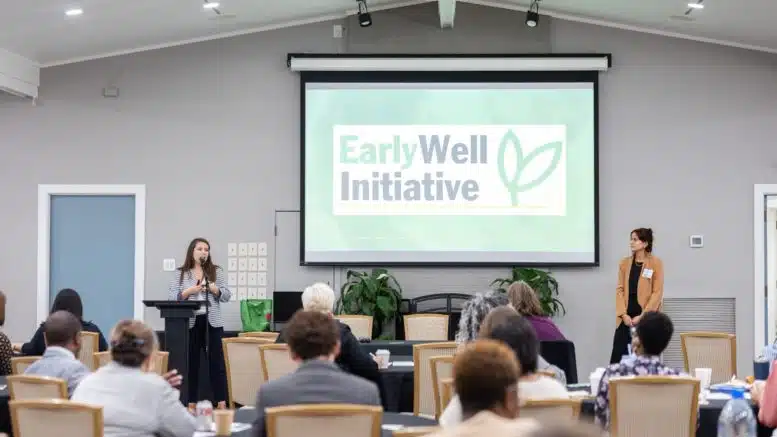By Jennifer Fernandez
CHAPEL HILL — After more than a year delving into 30 policy issues around infant and early childhood mental health, the EarlyWell Initiative has announced its top six priorities to work on through 2025.
The organization is an initiative created by a group of child welfare advocacy organizations with the goal of building “a robust, evidence-based, and accessible early childhood mental health system in North Carolina.” Its priorities range from expanding birth doula care to providing more support to foster care caregivers.
They have developed a 10-year advocacy plan — a living document that can and will be reviewed annually, organizers said during an Oct. 5 conference to announce the priorities to parents and early childhood advocates.
Barbara Leach, a family support specialist with the Family Support Network of North Carolina, said at the conference that for children to thrive, and not just survive, it is important to provide support, advocacy and leadership.
“That’s what sets the trajectory for long term, lifelong well-being,” said Leach, whose organization supports families of children with disabilities, mental health challenges or special health care needs. EarlyWell recommends that the Family Support Network get recurring funding from the state budget to continue its work.
That didn’t happen this year. The state budget that legislators passed last month was heavy on health care spending, but it did not include help for any of EarlyWell’s top priorities.
EarlyWell Initiative priorities
The EarlyWell Initiative has announced its top six priorities to work on through 2025. Here’s a summary of the group’s recommendations:
Doula care: NC Medicaid should cover birth doulas as a benefit.
Group prenatal care: NC Medicaid should ensure access to group prenatal care.
Family support services for children with mental health challenges: The Family Support Network of North Carolina should receive a $200,000 recurring state budget allocation and/or expanded state contract with the N.C. Department of Health and Human Services.
Reach Out and Read: Program should be widely implemented as a standard component of primary care. Need to find a sustainable way to scale the intervention as well as secure a recurring state budget allocation.
Supporting the early childhood workforce with professional development on mental health: State should ensure that the Pyramid Model is a foundational component of all early care and education classrooms and early intervention family services by providing continuing education resources and coaching offered by professionals trained in this evidence-based framework for developing young children’s social and emotional competencies.
Supports for foster care caregivers and the child welfare workforce: Increase accessibility to Kin Gap Training and Resource Parent Curriculum for caregivers; provide Trauma Training Toolkit to child welfare staff within two years of hire.
Some financial aid
However, the legislative session did provide support for one of the group’s priorities. Group prenatal care is included in Senate Bill 20, a bill probably best known for restricting abortion access. The bill became law after the General Assembly overrode a veto by Gov. Roy Cooper, who objected to the abortion restrictions.
The CenteringPregnancy model that is getting state dollars groups pregnant people together during prenatal care. Research has shown that this approach can have multiple benefits, from improving birth weight and nutrition to increasing prenatal visits and parents’ knowledge.

“It’s like developing a support network,” said Belinda Pettiford, N.C. Department of Health and Human Services section chief for Women, Infant and Community Wellness.
She said funding will be retroactive to July 1 once the state’s Medicaid program makes the changes.
“I think a couple of things for consideration as we are rolling out group prenatal care continually around North Carolina is thinking through how to get people trained in the model and making sure people are comfortable and that the support is there,” she said.
Senate Bill 20 also provides money to support families who foster children of relatives, the first time the state has offered that financial aid.
“Children in foster care have always been a special focus of EarlyWell, due to the risk for social, emotional, mental health challenges for this particular population,” said EarlyWell Director Morgan Forrester Ray.

Of the about 10,000 children in the state’s foster care system, close to 30 percent are 5 or younger, she said.
She said it was clear in the listening groups EarlyWell conducted across the state that foster care families need and want more supports for the children in their care.
Legislators included more money and reimbursements for “kin gap” providers, but those families also need support through training and resources, Forrester Ray said.
“Hopefully, we can move the needle in getting them the support that they need for doing the really important work that they do,” she said.
Doulas, reading and more
Several efforts during the legislative session to provide support for birth doulas failed to progress. Doulas are trained professionals who support pregnant people before, during and shortly after childbirth. Their work has been found to reduce the number of cesarean births and cut down on birth complications and medical interventions.
“We all know that improving maternal health, especially Black maternal health, is complicated and complex,” said Tina Sherman, a certified birth doula and senior campaign director of maternal justice for Moms Rising. “Doulas are part of that equation.”
Reach Out and Read North Carolina also did not get state funding in the latest budget or legislative session, although it has received $500,000 in non-recurring funds previously.
Reach Out and Read works with physicians to prescribe reading as a part of wellness checks for young children. Doctors can use the visit to assess developmental milestones. Parents leave with free, developmentally appropriate books for their children and are twice as likely to read to their children as parents who are not a part of the program, research shows. The national nonprofit, which has a regional hub that serves the Carolinas, also says children see their language development grow by three to six months compared with children not in the program.
“You never fully bank on any sort of state funding because that can come and go and be tricky,” state Director Amber Pierce said in an interview. The organization will look for other funding to continue expansion efforts, she said.

Another EarlyWell priority that tackles mental health are three statewide contracts that have helped all 100 counties get access to the Pyramid Model, which promotes healthy social and emotional development in young children. Advocates want the state to ensure that the program is a foundational component of all early care and education classrooms and of early intervention family services.
A major roadblock has been getting coursework added to college curriculums to teach the Pyramid Model, according to Smokie Brawley, statewide project manager for the Healthy Social Behaviors Project.
She said there are not enough people trained yet.
“It’s gonna take a whole lot more to really reach all of the children across our state and give them a great beginning to their education experience,” Brawley said.
EarlyWell started in fall 2019 as the NC Initiative on Young Children’s Social-Emotional Health, a collaboration among NC Child and early childhood leaders, including the North Carolina Early Childhood Foundation. The nonpartisan group rebranded in 2021 as EarlyWell.
The first phase of work involved surveying parents across the state about their concerns and needs around child well-being. Parents continue to be part of the process, with several attending the Oct. 5 conference.
“It’s just really exciting to see the level of parent involvement and parent advocacy,” Pierce said. “I think that’s something EarlyWell has done really, really well.”
The focus now turns to advocacy efforts to effect policy changes on the first six priorities.











